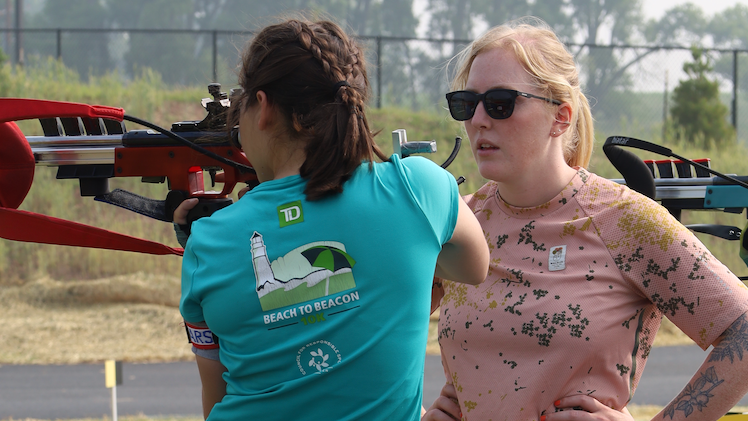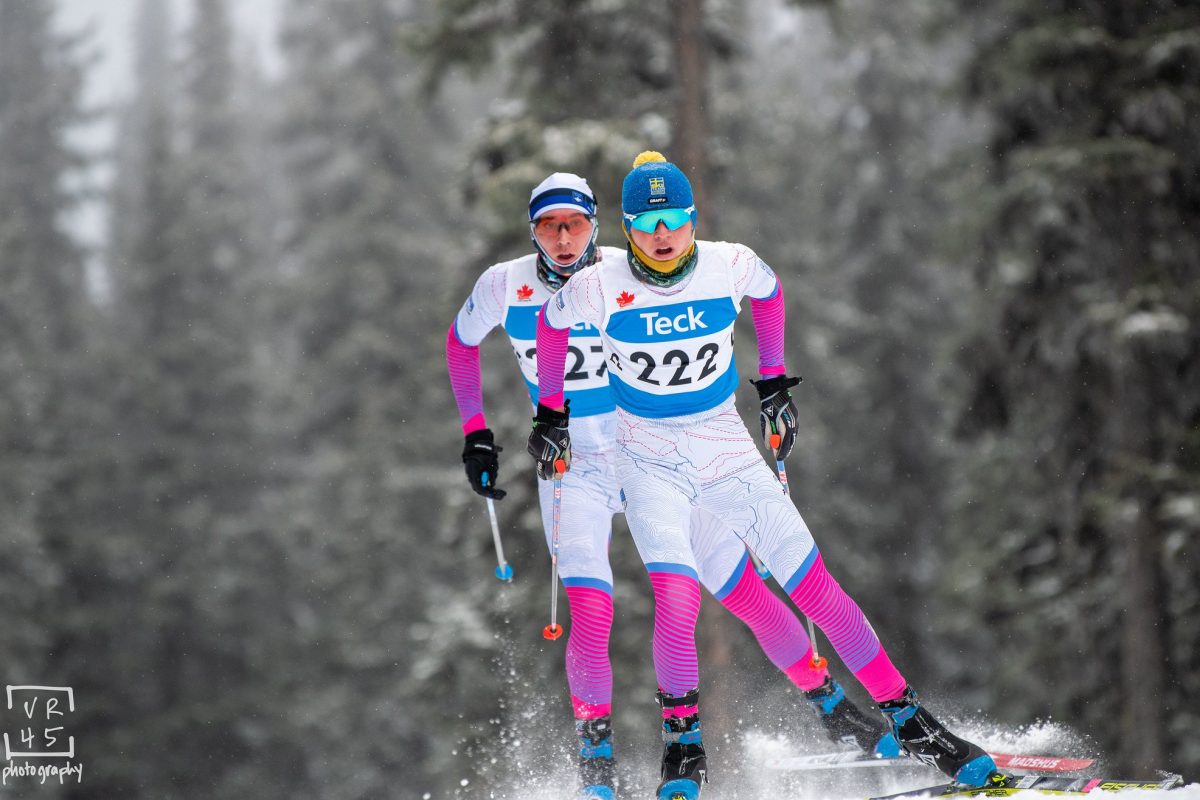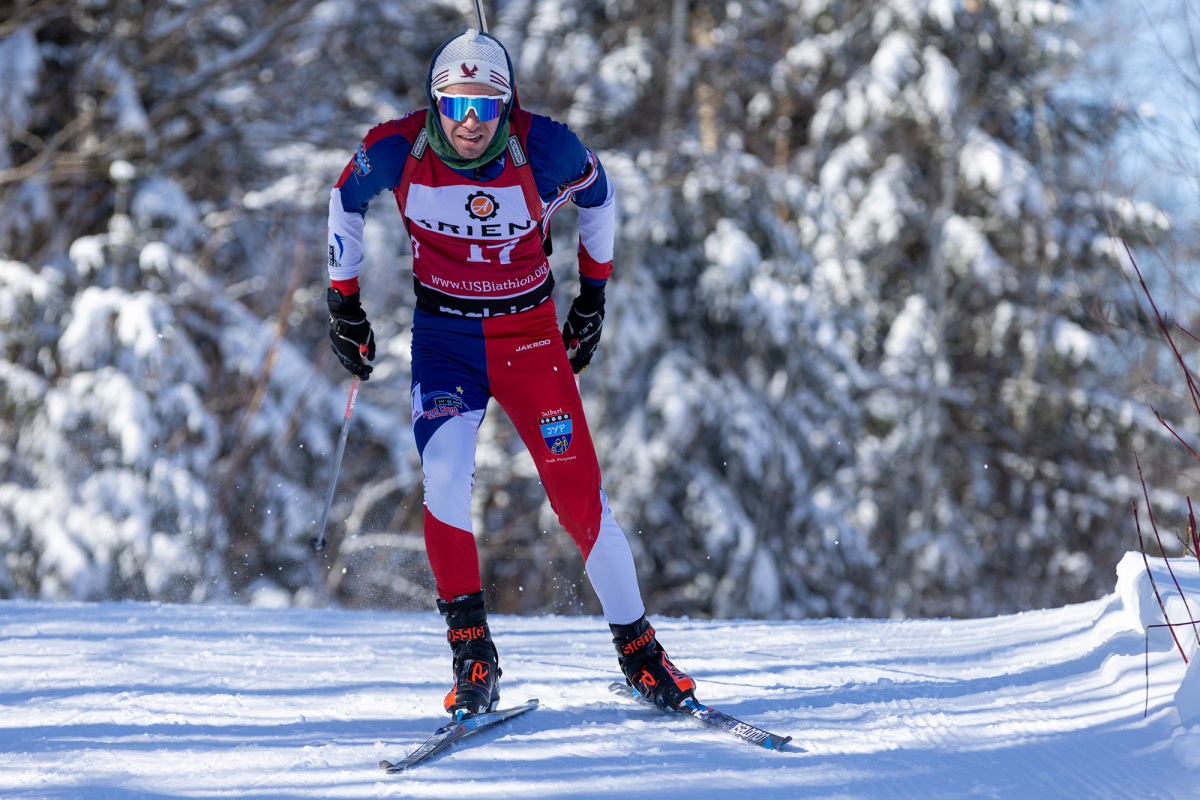
After what was perhaps the best day ever for North American women on biathlon’s World Cup circuit, U.S. racer Sara Studebaker was offered a unique way to approach the coming pursuit.
“There’s a bunch of you all hungry for more,” Studebaker’s brother Luke told her. Then he delved into new territory.
“[You are] like a pack of North American grey wolves, once endangered to the point of extinction but now flourishing under revamped federal policies. Tomorrow you gulp the overabundant Euro-Elk down to a more manageable population, all this under the shade of newly rebounding aspen groves.”
In Thursday’s sprint in Oslo, Norway, Canada’s Megan Imrie had led the way in 17th, with the last North American, Susan Dunklee, 46 seconds behind her in 35th. Every one of the women FasterSkier talked to after that race conveyed how excited they were about the group’s success, and about the potential to move up in the pursuit.
So did they do it? Did Studebaker’s wolf pack notch another record-setting day?
Well, not quite.
“It was clearly a little bit rougher day for us as a team and a continent than in the sprint, but we all had moments of brilliance,” Studebaker told FasterSkier after the race.

The wolf pack had diminished by one before the race was even over, with Annelies Cook being lapped and consequently pulled. Cook had scored her first World Cup points on Thursday, finishing 33rd, but missed five shots in the first three stages on Saturday.
“Biathlon giveth and it taketh away,” she wrote on her blog.
And Imrie, who had led the way in the sprint, dropped to 41st with five penalties. She told FasterSkier that she was tired and disappointed in her skiing, and called the race “a tough one.”
Instead of Imrie, Studebaker led the way in 25th after starting in 22nd and shooting clean for most of the 10 k, four-stage race. In the final standing bout, she missed two shots, which dropped her out of the top 20.
“It was a little crazy to move backwards with only two penalties, but there was some really good shooting out there, and I’m happy with my race overall,” she told FasterSkier. “I feel like I’m in a good spot right now: my skiing is coming on and I’m feeling good, and my shooting is solid.”
Studebaker said she wasn’t sure what happened in the final shooting stage, but hypothesized that the range approach might have done her in. It’s downhill, which would generally be seen as easy, but Studebaker pointed out that tucking into the range can leave athletes’ legs shaky and unstable when they need to stand perfectly still.
“I felt good about my approach, and was super confident after my first standing, but sometimes you just miss,” she said. “It was a bummer, but that’s biathlon! I can’t really complain about 90 % shooting.”
Studebaker was followed by Canada’s Zina Kocher, who slipped from bib 25 down to 29th place on the back of four penalties.

“Four misses is too much, especially on a day like today,” Kocher said. “I felt a little bit more tired than in the sprint, and then lost a sprint finish to [Norwegian] Elise Ringen after the final climb. I had been pushing my pace earlier on in the race and just didn’t have enough gas to stay ahead of Elise as she turned on the sprint before the downhill to the range.”
Kocher said that she hadn’t had problems with the cold temperatures, which started out at -23 Celsius in the morning before warming to -14, or about six degrees Fahrenheit, by race time. And despite having slightly tired legs, she was already looking forward to “another chance to fight” in her next race.
And Susan Duklee, too, was happy with her race. The American started and finished in 35th, maintaining her position despite five penalties.
“I definitely had hoped to hit more targets in prone today, but I’m really excited about my standing,” Dunklee wrote in an e-mail, alluding to the fact that four of those five penalties came in prone. “I had been struggling with that in the last couple of races. I finished my bib number and didn’t lose any places- that’s progress for me.”
Even though the women couldn’t entirely capitalize on their starting positions, Studebaker, Dunklee, and Kocher all looked at the bigger picture and believed that it had been a good weekend for the teams.
“I’m still riding the energy from our team result the other day, and it was amplified even more when we saw how well the U.S. Ski Team girls did in Russia,” Dunklee said. “This week has been a tremendous confidence booster, and with only a few weeks until World Championships, this is a great time for the team to come on strong.”
Kocher had the most tangible excitement, since her performance qualified her for Sunday’s 30-woman mass start. Once a mainstay in mass starts, Kocher hadn’t been invited to participate much recently, so this was a big step.
“I’m incredibly pumped to be racing a mass start again,” she said. “It has been a very long time since I last qualified! I qualified in the first mass start of the season in 2010, but before that it was 2006-2007, the year before I had mono, that I was consistently doing them.”
Of all the North American women, only Dunklee has participated in a mass start so far this season. Having more different women compete in the highest-profile races was one symptom of what Studebaker said were the rising fortunes of North American biathlon.
“I think we’re slowly letting the Europeans know that they can’t count us out,” she said. “It seems like we’re all feeling strong just in time for the most important part of the season, which is key. We have plenty of opportunity to do a little more hunting.”
Magdalena Neuner of Germany led the race from start to finish, winning by 36 seconds despite accruing two penalties. A clean-shooting Olga Zaitseva of Russia placed second and Darya Domracheva of Belarus third.
Full results





One comment
nyctvt
February 5, 2012 at 5:26 pm
Two races shooting 90% and overall good results congratulations to Sara Studebaker on a good weekend!